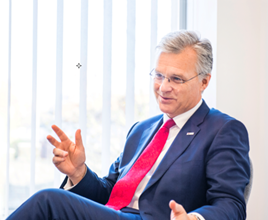Back to Carne. I tell him that whatever he says about devolution working, what I’ve been picking up in the routes until recently is that there’s still too much centralisation and too much control by the company’s controversial Infrastructure Projects (IP) division. On the day that Hendy was appointed, in 2015, Carne told me himself that the polarity of the relationship between IP and the Route Managing Directors was to be reversed, and that the RMDs would become clients and IP a supplier. Until recently, all I could detect in the routes was various versions of “yeah, right…”
Carne isn’t happy with this at all.
“Firstly, I absolutely am in a place where IP is a provider of services to the Routes - it is the project delivery organisation that the routes depend on to deliver their projects. But it doesn’t have to be the only way in which projects have to be delivered.”
You said at RAIL’s National Rail Conference last year that you would open projects up to the private sector if they didn’t compete - and your contestability review reinforced that view. Is this for real, or is it window dressing?
“It is absolutely real! If somebody else thinks they deliver infrastructure better than we can, I am more than happy to let them do it. If people think they can build platforms and stations that are better and cheaper, let them do it. That’s a very important point.”
Is Carne happy with IP’s relationship with the routes? The answer is thoughtful, and if not evasive then careful.
“I would say that I am very happy with the structure we’ve put in place.”
That’s not exactly a ‘yes.’
“I would say that is the right structure. If you want to spend £100m on investments every week you need a really world-class, professional organisation to do that well, so that’s what IP is about. I fundamentally believe in that model.
“However, I also believe that the ‘docking point’ with the routes needs to be strengthened. I think that we need a stronger sponsorship organisation within the routes that is capable of holding IP to account to deliver, but also to understand, what our customers really want and make sure that what we deliver actually meets those needs. That is something to be identified in our transformation plan that we need to work on - and we are working on it.”
That sounds like he believes the structure is right, but that it’s not working as he wants it to yet. Also, there is a view in the industry that a lingering legacy of the previous regulatory regime, which allowed ‘credit card’ borrowing and endless ‘moving to the right’, resulted in engineering becoming disconnected from its purpose in delivering a railway for customers. Also, that there was no effective challenge within the industry to those rising costs.
“I wouldn’t really agree with that - no,” he replies. “We have project delivery teams in IP and we have within IP levels of assurance, functional assurance and challenge. We now make sure we have standard cost estimating norms that we use across the industry, so people can’t just develop their own costs locally. We DO have challenge processes.”
But then he hints once again at the need for the routes to be gutsier in taking the control he’s offering them.
“The sponsorship role within the routes will be a mechanism for which a stronger challenge can be brought. Market competiveness in that is a very healthy discipline as well - so yes, we DO want to see other people come forward and want to build stuff on our railway.
“At the same time, we must remember our parallel system operator responsibility, so we have to manage the overall way in which trains and timetables operate across the network. We must also maintain consistent and safe technical standards across the network. But I am determined to allow others to come in and innovate and do things differently if they wish to.”
One criticism I pick up on is a view that IP doesn’t have the true private sector culture that Carne says he wants - they don’t behave like their jobs depend on their performance because they are way back from the front line and don’t feel the heat. Also, that there is a tendency to ‘lump in’ other modernisations within a specific project, and that this drives costs up. IS he inviting the RMDs to challenge all this?
“Those things are a quite common cause of cost escalation, because if you’re…”














Login to comment
Comments
No comments have been made yet.